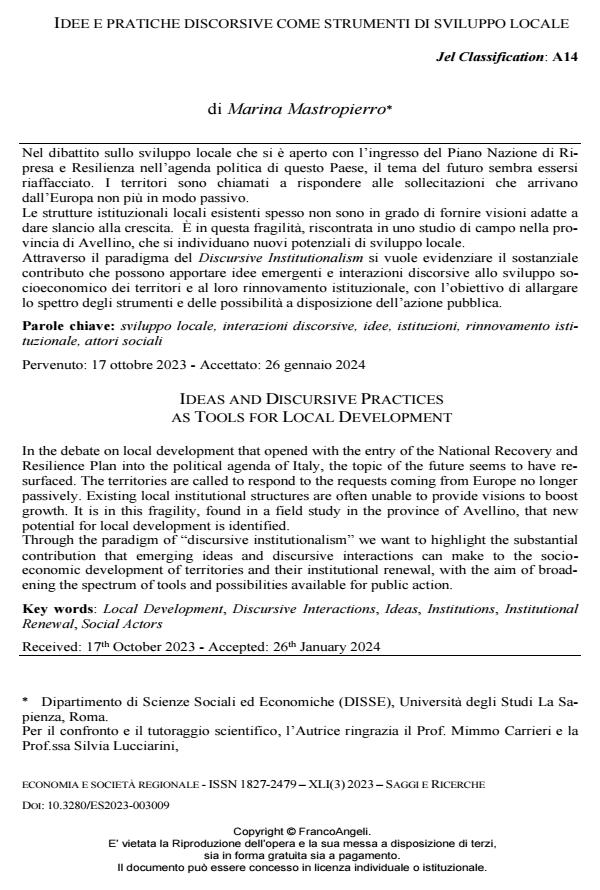ideas and discursive practices as tools for local development
Journal title ECONOMIA E SOCIETÀ REGIONALE
Author/s Marina Mastropierro
Publishing Year 2024 Issue 2023/3
Language Italian Pages 24 P. 151-174 File size 345 KB
DOI 10.3280/ES2023-003009
DOI is like a bar code for intellectual property: to have more infomation
click here
Below, you can see the article first page
If you want to buy this article in PDF format, you can do it, following the instructions to buy download credits

FrancoAngeli is member of Publishers International Linking Association, Inc (PILA), a not-for-profit association which run the CrossRef service enabling links to and from online scholarly content.
In the debate on local development that opened with the entry of the National Recovery and Resilience Plan into the political agenda of Italy, the topic of the future seems to have resurfaced. The territories are called to respond to the requests coming from Europe no longer passively. Existing local institutional structures are often unable to provide visions to boost growth. It is in this fragility, found in a field study in the province of Avellino, that new potential for local development is identified. Through the paradigm of “discursive institutionalism” we want to highlight the substantial contribution that emerging ideas and discursive interactions can make to the socioeconomic development of territories and their institutional renewal, with the aim of broadening the spectrum of tools and possibilities available for public action.
Keywords: Local Development, Discursive Interactions, Ideas, Institutions, Institutional Renewal, Social Actors
Jel codes: A14
- Becattini G. (2000). Il distretto industriale. Torino: Rosenberg & Sellier. Bezzi A. (2013). Fare ricerca con i gruppi. Milano: FrancoAngeli.
- Bobbio L. (2000). Produzione di politiche a mezzo di contratti nella pubblica amministrazione italiana. Stato e Mercato, 58(1): 111-141. DOI: 10.1425/444
- Boudon R. (2003). Beyond Rational Choice Theory. Annual Review of Sociology. 29(1): 1-21.
- Bourdieu P. (1979). La distinction. Critique social du jugement. Paris: Les Editions de Minuit.
- Carifano R. (2023). In Irpinia, oltre ai giovani che vanno via, non tornano gli anziani. In: Ortìcalab -<https://www.orticalab.it/In-Irpinia-oltre-ai-giovani- che-vanno>.
- Carrieri M. (2022). Temi e percorsi per ripensare lo sviluppo dell’Irpinia e del Sannio. Prefazione. In: Mastropierro M. I territori. Nuovi attori politici dello sviluppo locale?. Avellino: Guido Dorso Edizioni -<https://www.centro dorso.it/wp-content/uploads/2022/07/volume-mastropierro-E-BOOK.pdf>.
- Carrieri M. (2023). Capitalismi fragili. Lavoro e insicurezza in una società divisa in due. Milano: Feltrinelli -<https://fondazionefeltrinelli.it/app/uploads/ 2022/12/Finale_Capitalismi-fragili.pdf>.
- Coin F. (2023). Le grandi dimissioni. Il rifiuto del lavoro e il tempo di riprenderci la vita. Torino: Einaudi.
- Connolly W.E. (1983). The Terms of Political Discourse. NJ: Princeton University Press.
- Fina S., Heider B., Prota F. (2021). Italia diseguale. Disparità socioeconomiche regionali in Italia. Feps-Fondazione Ebert -<https://library.fes.de/pdffiles/bueros/rom/18131-20210713.pdf>.
- Gramsci A. (1975). Quaderni del carcere. Torino: Einaudi.
- Granovetter M. (1985). Economic Action and Social Structure: The Problem of Embeddedness. American Journal of Sociology, 91(3): 481-510. DOI: 10.1086/228311
- Habermas J. (1981). The Theory of Communicative Action. Boston: Beacon Press. Vol. 1.
- Hay C. (2006). Constructivist Institutionalism. In: Rhodes R.A.W., Binder S.A., Rockman B.A., Ed. The Oxford Handbook of Political Institutions. NY: Oxford University Press.
- Mastropierro M. (2019). Che fine ha fatto il futuro? Giovani, politiche pubbliche, generazioni. Roma: Ediesse.
- Mastropierro M. (2022). I Territori. Nuovi attori politici dello sviluppo locale?. Avellino: Guido Dorso Edizioni -<https://www.centrodorso.it/wp- content/uploads/2022/07/volume-mastropierro-E-BOOK.pdf>.
- Muller P. (1995). Les politiques publiques comme construction d’un rapport au monde. In: Faure A., Pollet g., Warin P., Eds. La construction du sens dans les politiques publiques. Débats autour de la notion de référentiel. Paris: L’Harmattan.
- Pichierri A. (2003). Tesi sullo sviluppo locale. Studi organizzativi, 3: 69-88. 10.1400/68681.
- Putnam R. (1993). La tradizione civica nelle regioni italiane. Milano: Mondadori. Ricciardi T., Picone G., Fiorentino L., (2020). Il terremoto dell’Irpinia. Roma: Donzelli Editore.
- Ricciardi T. (2016). Marcinelle, 1956. Quando la vita valeva meno del carbone. Roma: Donzelli Editore.
- Sabel C. (1994). Learning by monitoring: the institutions of economic development. In: Smelser N.J., Swedberg R., Ed. The handbook of economic sociology. NJ: Princeton University Press.
- Schmidt V.A. (2002). The Futures of European Capitalism. NY: Oxford Univesity Press.
- Schmidt V.A. (2005). Democracy in Europe: The Impact of European Integration. Perspectives on Politics, 3(4): 761-779.
- Schmidt V.A. (2008). Discursive Institutionalism: the explanatory power of ideas and discourse. In Annual Review of Political Science, 11:303-326.
- Searle J. (1995). The Construction of Social Reality. NY: Free Press.
- Trigilia C. (2005). Sviluppo locale. Un progetto per l’Italia. Roma-Bari: Editori Laterza.
- Veltz P. (1996). Mondialisation, villes et territoires: une économie d’archipel. Paris: Puf.
- Veltz P. (2002). Des lieux et des liens. Politiques du territoire à l’heure de la mondialisation. La Tour d’Aigues: l’Aube.
- Viesti G. (2023). Riuscirà il Pnrr a rilanciare l’Italia?. Roma: Donzelli Editore.
Marina Mastropierro, Idee e pratiche discorsive come strumenti di sviluppo locale in "ECONOMIA E SOCIETÀ REGIONALE " 3/2023, pp 151-174, DOI: 10.3280/ES2023-003009